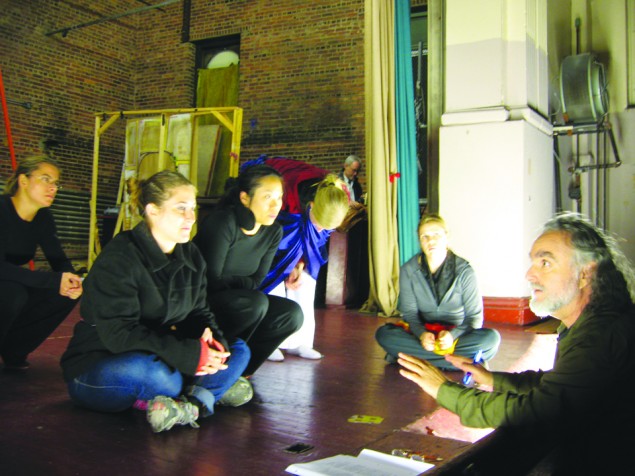
Photo by Shelley Marlow: Thomas Lawrence Toscano in rehearsal with cast members of his production of Puccini’s opera Suor Angelica. (L to R) Erin Carroll, Casey Hutchinson, Rhea Lee, Elizabeth Bouk, Jennifer Lindshield. Off-stage is pianist Bill Lewis.
Puccini’s Suor Angelica by OperaOggi at the McCaddin Theater
By Jacqui Danilow
There is something truly magical when a performance of an opera that you know extremely well takes you back to the very first time you heard it. The production of Suor Angelica by OperaOggi on Sunday was a totally new and different experience, making it a near-complete success. Performed at the McCaddin Theater in the Williamsburg section of Brooklyn, the venue not only lent itself to the performance, but actually enhanced the drama of this turn-of-the century one-act opera by Giacomo Puccini.
Suor Angelica is part of a three-opera trilogy written in the verismo style, popular from the 1890s–1920s, that takes real-life scenes (“verismo” in Italian) featuring abrupt plot changes and desperate conflicts between ordinary people, conveying a very dramatic story and set of emotions. Some critics have suggested that the operatic style was the musical fore-runner of the Fellini films that dominated Italian cinema in the mid-20th century.
Puccini, famous for his soaring melodies and heart-wrenching characterizations, created this opera for an all-women cast. Set in a convent, the story revolves around the embarrassing and unfortunate predicament of Angelica, who has had a child out of wedlock, forcing her family to banish her to life in a convent to repent her sins.
As always, opera uses a story and emotional conflicts set in a particular time and place, but which can often be understood in just about any other time and place. Using different contexts, most successful operatic dramas portray universal emotions through the equally universal language of music.
The McCaddin Theater was built in 1898 as a concert hall, then turned into a church in the 1920s, and a school in the 1950s. It currently functions as the set for a television police docudrama. Yet it turned out to be the perfect setting for OperaOggi. Sitting in the big and drafty room, one could not help but think of life in Williamsburg, both now and then, compared to life in 19th century Italy. Maybe it was the non-heated space, the rather small audience attendance (under 50), or the out-of-tune piano that conjured up the spirit of Puccini himself—sitting at the piano, accompanying some of his young protégés, so that he could hear his latest score before setting the orchestrations.
Maestro Thomas Lawrence Toscano encouraged his wonderful troupe of women to sing superbly, using the booming acoustics of the hall to great effect. From the opening ensemble of the nuns walking through the audience up to the altar onstage (accompanied by Anne Bloom on obbligato flute), to the wonderful solo singing by Jennifer Lindshield as Suor Angelica and Elizabeth Bouk as the evil Princess-Aunt, all combined to create a satisfying experience.
Working on a (very) bare-bones budget, the projected super-titles were a little hard to read, but the underlying story, by Giovacchino Forzano, was easy to grasp, thanks to the nicely paced tempi from Maestro Toscano. Pianist Bill Lewis helped make all seven scenes flow cohesively.
Some simple props and a minimal set combined with effective stage direction also helped forge an engrossing performance. For example, an angel was sitting onstage completely still from the time the house opened, giving no clue that she would come stunningly to life in the final Miracle Scene.
All in all, kudos to the Maestro, to the principal singers, the entire cast, the piano and flute accompaniment, and to the McCaddin Theater—in its temporary role as an opera house.
Ed. Note: OperaOggi performs again in Greenpoint in May. The group is looking for new venues. If you can offer ideas, please contact them at info@operaogginy.com.
Leave a Reply